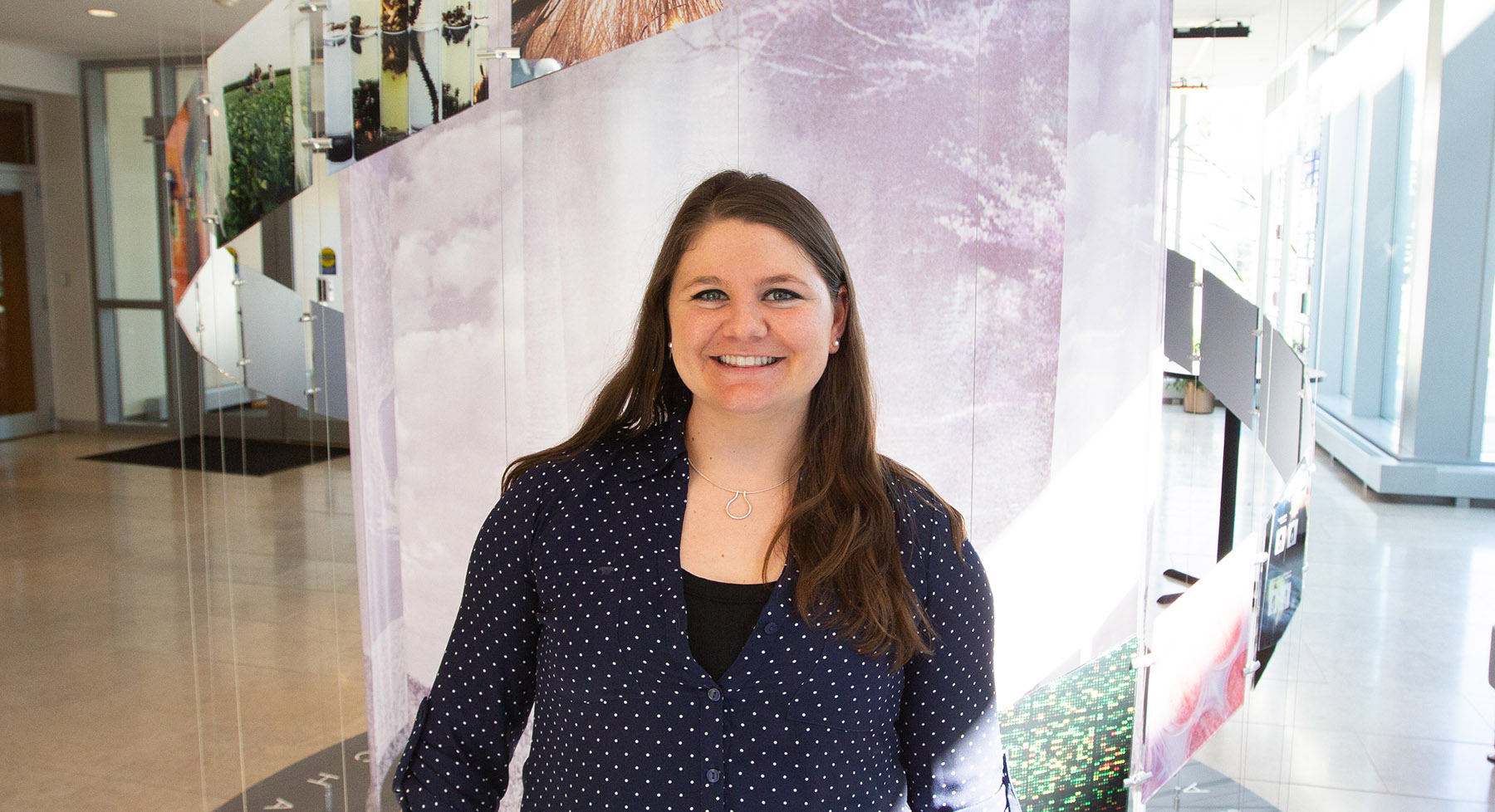By: Shelby Lawson
Studying behavioral and morphological responses to environmental cues in poison frogs
Ask Lisa Surber her thoughts on science and the natural world and you’ll find passion and excitement practically radiate off her as she responds. For Surber, who is currently a 3rd year PhD candidate in the Evolution, Ecology, and Behavior department at University of Illinois Urbana-Champaign, this interest in science and nature has been present within her ever since she was young:
“I grew up in Sonoma County in California, and didn't realize what a privilege it was to grow up there until after I moved away,” said Surber. “You get spoiled because you're next to the redwoods, beautiful creeks, and the beaches there too. So, I got a lot of experiences in nature early on.”

From her youth, Surber knew she would pursue a career in science, but as she grew she found herself bouncing between different career aspirations, from veterinarian to astronaut to ophthalmologist, to name a few. By the time she was working on her undergraduate degree at Mills College, a small women’s college in California, she was set on becoming a pediatrician. However, she found the enormous amount of learning material daunting, and this experience almost intimidated her away from science. An evolution class in her second year inspired her to keep going, though on a different path than before.
“Learning about evolution was the coolest thing ever!” exclaimed Surber. “I wasn’t really taught about evolution at all in high school, so I didn't understand how connected everything was, and how simple the mechanism of evolution really is. It can lead to these drastic, beautiful adaptations that we can see, and I just love to think now about this beautiful connection we all share.”
Later in her undergraduate career, she tried her hand at animal behavior research, studying stress responses in ground squirrels under her mentor, Jennifer Smith. Surber found this research to be rewarding, and so, after graduating, she went for her master’s degree at Sonoma State University under advisors Jeff Wilcox and Derek Girman. Here, she examined movement patterns of California red-legged frogs and invasive bullfrogs. Surber says it was then that Smith, her previous advisor, reached out to her because Eva Fischer (GNDP), a new assistant professor in evolution, ecology, and behavior at Illinois, was starting up a lab that focused on plasticity of behavior in frogs, and she recommended Surber apply there for her PhD.
Surber now works in the Fischer lab, studying how dyeing poison frogs detect cues from the environment, and change their behavioral and morphological phenotypes in response to these cues. In this species, the dads will carry and deposit their tadpoles into standing pools of water, and leave them to fend for themselves.
“In the wild, there's a lot of variation in the kind of pools that they can be in,” Surber said. “Dads put the tadpole in between logs or plants, basically wherever water can collect. Sometimes they'll be in there by themselves, but then other times they'll have a lot of conspecifics with them.”
As such, the tadpoles grow up in a variety of different environments, and cues from these environments may affect their behaviors, as some become increasingly aggressive and cannibalistic towards others. “It really adds drama to the types of phenotypes I measure,” Surber remarked. Specifically, Surber examines the effects of different smells in the water, such as food, conspecifics (member of the same species), and predators.
In her experiments thus far, Surber has found that tadpoles reared by themselves grow faster and larger, and survive better during the earlier stages of life than those reared with others. She also found that tadpoles reared alone are more aggressive than tadpoles reared together. Surber says that this plasticity in behavior is a strategy for the frogs.
“If you're in a pond with a bunch of other tadpoles, there's a risk to starting a fight,” Surber explained. “They have the same weapons, and could turn around and bite you back. So tadpoles in this environment need to play it cool. But if you were reared by yourself and you're able to grow up faster, then it's beneficial to be aggressive. If another tadpole is introduced into your pool and you attack, then not only are you eliminating a competitor, but then you’re also like ‘thanks for the snack’.”
Surber says her projects are now starting to look at mechanisms behind this plasticity, including levels of hormones and neurotransmitters. Her latest project found that tadpoles reared alone also have higher levels of corticosterone, a hormone that mobilizes glucose, and is associated with stress. This hormone is also associated with metamorphosis in frogs, and Surber says high levels of corticosterone in the loner frogs may be what helps them grow faster.
In addition to her lab work, Surber says she has many hobbies and pets that keep her life busy and fun, with the word “many” being no exaggeration. Surber loves staying active with weightlifting, judo, boxing, and soccer, and taking her dog Sequoia on long walks. Along with her dog, she also keeps pet cats, turtles, frogs, and fish. Remarking she had almost all of the animal kingdom except for insects and birds, she commented “My best friend Chelsea has a pet bird, so that taxon is covered!”
Something Surber is very passionate about is mentoring undergraduates, both when teaching classes and when hiring assistants in her research. The mentoring she received from Smith back when she was an undergraduate inspired her to want to do the same for others.
“Smith made such a huge difference in my life, not only in the science that she taught me, but she emphasized that science really is for everybody,” Surber said. “She made me feel so included just by being the goofy and caring woman she is, and I want to be able to do that for other people as well. I want to give back to the community and make sure people have good experiences in science, even if they don’t end up pursuing a career in it. I just want them to remember that science can be fun, and sometimes hard, but mostly fun, and it helps you grow.”
Surber hopes to instill this sense of curiosity and excitement about the natural world in all of her students, and states that Sir David Attenborough, her favorite narrator of nature documentaries, said it best:
“It seems to me that the natural world is the greatest source of excitement; the greatest source of visual beauty; the greatest source of intellectual interest. It is the greatest source of so much in life that makes life worth living.”
By: Shelby Lawson
Photos By: Isaac Mitchell


